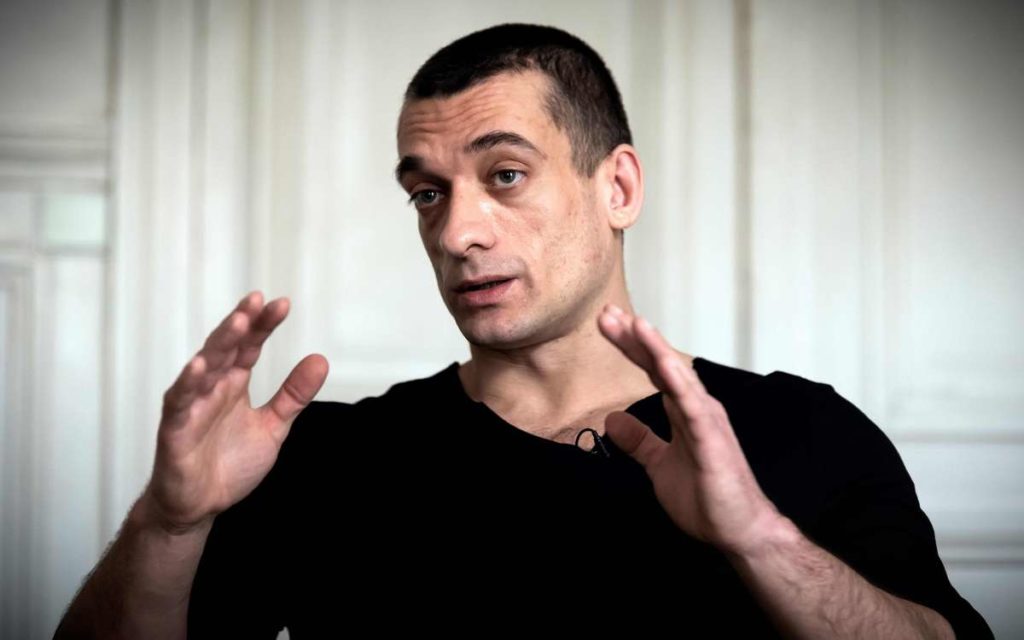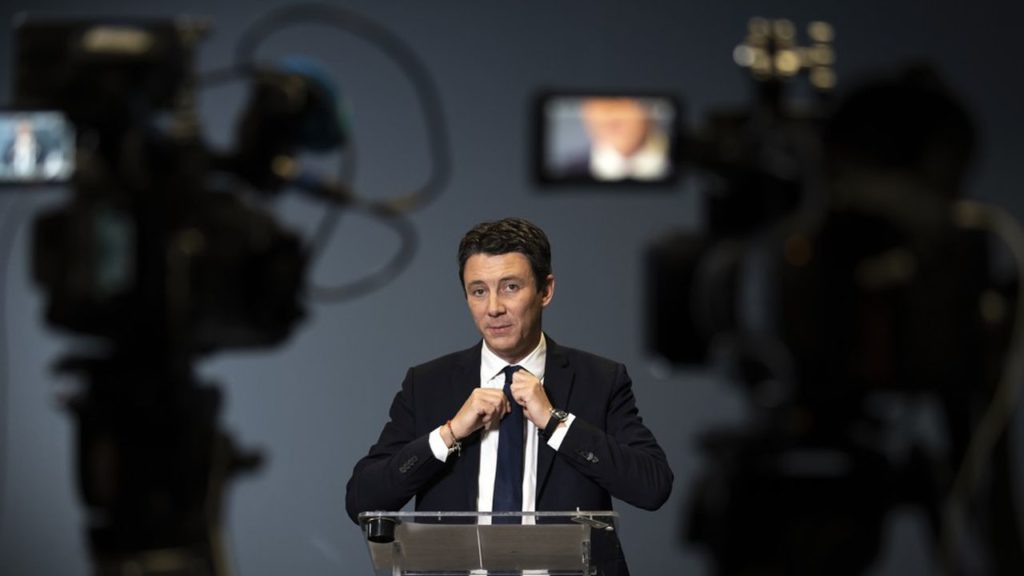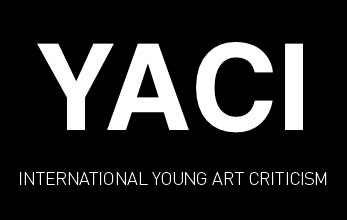The little black Piotr and the big Monsieur Grivois
The intricacies of art and politics are clear, Deleuze saw a “fundamental affinity between the work of art and the act of resistance” (1), minus those with the political agenda, but there is no shortage of examples either, of Aragon and his communist commitment to the late activism of Joseph Beuys, even the sociological art of Fred Forest, but the (artistic) interference with a democratic process, or let us say more soberly electoral process, seems to be unheard of.

I don’t think it’s necessary anymore to recall the facts, rather to consider them according to an appeased perspective – there is no drama, if not a romantic conspiracy. The first lesson of Piotr Pavlenski’s action, via his site Pornopolitique, is first of all the gradual evolution of his modus operandi. Over time, what was a performance, an act of dramaturgy – sewing his lips together in support of the Pussy Riot (2012), climbing naked up a wall of the Serbski Centre compound and cutting off his right earlobe to condemn the political use of psychiatric centres (2014) or nailing his scrotum to the cobblestones of Red Square (2013) – gradually had increasingly clear implications in reality, that of the res publica, notably through fires at the doors of institutions, such as the Loubianka, the headquarters of the Russian services (2015), or in France, those of the Banque de France (2017). With this new affair, the slip from a discursive-automutilation act (one denounces through a symbolic act attacking his own integrity) for a pragmatic-mutilation act (one influences reality through an intervention attacking the integrity of the collective) is acted upon. We have here an act of creation through a media, a website, and a known method, the Soviet kompromat or shaming, in its modern version, on the Internet.
The publication of these images is therefore an act of high reflexive density, in the sense that it reflects the functioning of our political and social system, without, it would seem, we dare to observe the reflection it offers, quite ugly, it goes without saying. Indeed, I think it should not be analyzed as an individual will to harm, Pavlenski didn’t even know Griveaux, but to exhibit the functioning of a system that he judged “corrupt” and “hypocritical”. Griveaux found himself, through an unfortunate combination of circumstances, the first target of a conviction that exceeded his grasp. What is targeted is not the individual, but the structure within the individual. So, yes, Mr. Griveaux was caught with his hand down his trousers, which in itself should interest no one, and above all, should interest only him and the recipient of his messages, but public opinion, prudish as it is, gives importance to these things, is driven by the morbid impulse to know, mock and condemn the sexuality of those in power. Nihil novi sub sole, we remember the “five minutes shower included” of Chirac, Monica Lewinsky/Bill Clinton and the FBI who used to bring in prostitutes to unload JFK before his speeches, that business or public opinion has effectively demonstrated his insatiable thirst for compromising images. What is new, and Pavlenski was the first to be surprised, is the surrender of Griveaux. What made this story, which gives it substance (political and artistic), when it could all have been just a wave, is the fact that Griveaux is going to bed, not least because we no longer expect political figures to set an example (which happens before the law, no crime here), we expect them to be pure – which Michel Tournier quite rightly considered to be the malignant inversion of innocence (2).

Beyond the existing hysteria around the sexuality of the rulers, this action shows above all, the way power and influence relations are constructed – absolutely undemocratic. Perhaps the most fundamental reason why Piotr Pavlenski is an artist in this story is that he does not use this situation for his own purposes except as a good cheap spotlight. It is as if no one questions the amateurism of a candidate for the Paris municipality, who after having been the spokesman for the Elysée Palace, and therefore a communicator, leaves his nudes lying around in the wilderness and takes no care to protect himself – and therefore the nation he represents. All this could have been amusing if a potential elected representative of the Republic did not show that he could easily be manipulated in the face of people even less well-meaning than Piotr Pavlenski, that he could submit to pressures that favoured particular interests before the general – the individuals being those who have the “files”. He uncovered, even though we already knew it, some worrying abuses. In this context, Piotr Pavlenski acts as a kind of whistle-blower.
Secondly, it is the response to this action that raises questions. It crystallises the fears of our system as well as its resilience. To pursue the metaphor of reflection, it would seem that we do not take the time to observe the reflection that the Russian is sending back from our democracy too busy condemning the mirror. Piotr Pavlensky has been accused of everything, first of being in the pay of Russian power, not that many commentators have crossed the line in total disregard of the presumption of innocence. He has also been accused of acting under the guise of misplaced morality, yet I can hardly believe that one who chose to go into exile in France because “it is the homeland of the Marquis de Sade, the greatest Frenchman of humanity” (recently declared to Le Monde), would take offence at masturbation or an extra-marital relationship. The way in which the watchdogs started barking is exemplary. The same ones who impose their rules and limits on the “democratic” debate and shout loudly as soon as we get out of it. Piotr Pavlenski’s action is not devoid of violence, but confined to the symbolic sphere, and is in line with that of the anarchists, who return their violence to those who use it against the people. Kropotkin in the text. It must be hammered out, Piotr Pavlenski (like Griveaux for that matter) is not the creator of the indigent system that everyone is moved by, he is a creature of it. If his action has worked, no matter how insane it may be, I can easily admit that this form of porn revenge is disgusting, and raises for some the question of the limits of the artistic act, it is on the bed of social and political failures. One is even astonished (and worried) by the ease with which a grain of sand jams the machine. All this sounds like the paragon of political affect, of the indignation on social networks (the evil of the century), of political-image or political-show. And this is how Pavlenski becomes an ambivalent pharmakon figure: a scapegoat, whom we want to send home because here he stirs up too much of the mud we don’t want to smell, a poison. On the other hand, to say that Pavlenski is a remedy (since the pharmakon is the scapegoat, the poison and the remedy at the same time) would be a bit too much to say, but at least it serves to reveal the failures of the system, as well as the difficult involvement of contemporary art in the political game.
In short, the machine is on its way. Complaints are filed, the Pornopolitique site is closed, the crushing of the democratic machine is set in motion with its share of indictments, police custody… and the onlookers who marvel at Courbet in Orsay during their Sunday visit, praise his values, his strength, his iconoclastic ardour, will be the same ones who will want to make Pavlenski pay for the Vendôme column.
(1) Conference “What is the act of creation? “given as part of the Tuesdays of the Femis Foundation, 17 May 1987.
(2) Le Roi des aulnes, Michel Tournier, Gallimard, 1970.






